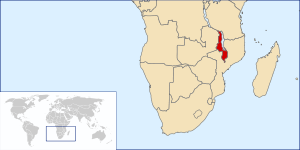 Image via Wikipedia
Image via WikipediaThe Malawi authorities have told gay activists who put up posters and distribute leaflets on the streets anonymously to "come out in the open".
Government official Kingsley Namakhwa said it was against the law to mount such campaigns anonymously.
But he also pointed out that homosexuality was illegal, and anyone promoting it would be prosecuted.
Rights groups have recently criticised Malawi for prosecuting two men who got engaged to each other.
Tiwonge Chimbalanga and Steven Monjeza, believed to be the first gay couple in Malawi to start the marriage process, have pleaded not guilty to charges of public indecency.
Their trial is due to start soon.
"As far as the Malawi government is concerned we only have two gays in Malawi - Steven Monjeza and Tiwonge Chimbalanga," said Mr Namakhwa.
"If there are others, let them come out in the open."
The BBC's Raphael Tenthani, in the main city Blantyre, says the police have intensified the hunt for a man who they believe is behind a gay-rights campaign.
It follows the conviction of a 21-year-old man for pasting gay-rights posters on poles along the streets.
Peter Sawali had put up posters saying "gay rights are human rights" and was convicted of conduct likely to cause a breach of the peace.
Police say Sawali had been given the posters by another man - whom they are now trying to track down.
Sawali was sentenced to community service for his crime - our correspondent says his punishment is to clean the premises of Blantyre Magistrates Court for 60 days.
~~~~~~
African civil society condemns Malawi criminal prosecution of same-sex case
Source: Legalbrief Africa - 28 January
Over forty African civil society organizations, in a statement released today, expressed their deep concern at the imprisonment and prosecution of Steven Monjeza and Tiwonge Chimbalanga under provisions of Malawi's penal code criminalizing private sexual behavior. They called on the Malawian government to drop all charges against both individuals and repeal the discriminatory criminal law.
On 28 December, police officers arrested Monjeza and Chimbalanga at their home, charging them under sections 153 and 156 of the Malawian penal code for "unnatural offences" and "indecent practices between males." This happened two days after Monjeza and Chimbalanga conducted a traditional engagement ceremony, an event that was widely reported in the Malawian press. Chimbalanga was forced to undergo a medical examination to determine whether they had engaged in sexual intercourse, and both were subjected to a psychiatric evaluation. They have been denied bail and remain in custody.
The group of endorsers, which includes organizations from over a dozen African countries, warned that such criminal prosecution would greatly undermine efforts to respond effectively to the HIV pandemic, stating: "The charges against Monjeza and Chimbalanga have caused a widespread fear among persons engaged in same-sex relations--a group the Malawian government has recognized is vulnerable to discrimination and critical to its efforts to effectively respond to the HIV epidemic."
According to media reports Dr. Mary Shawa, the Principal Secretary for Nutrition, HIV and AIDS in the Malawian President's Office reportedly acknowledged the need to "incorporate a human rights approach in the delivery of HIV and AIDS services to...men who have sexual intercourse with men." She further asked men who have sex with men [MSM] to come out in the open in order to assist in HIV prevention efforts.
The statement warns that "This cannot be done given recent statements by governmental officials denouncing MSM, which has served to further drive this already vulnerable community further underground."
Discrimination against men who have sex with men has increasingly raised public health concerns in the African region, where HIV rates among this group are up to ten times that of the general population in large part because they are systematically marginalised due to politically driven hostility. United Nations Secretary-General Ban Ki Moon warned that such discrimination is unethical and "makes no sense from a health perspective".
The statement which was also supported by almost twenty additional individuals and international civil society organizations further highlighted how sections 153 and 156 of the penal code violated fundamental rights guaranteed under the Malawi Constitution, including the rights to be free from discrimination and human dignity.
Undule D.K. Mwakasungula, the Executive Director of the Centre for Human Rights and Rehabilitation, stressed that "HIV and human rights cannot be separated. We need our governments to support progressive approaches to health that are not based on prejudiced notions of morality, but on evidence-based responses to the reality in our region."

![Reblog this post [with Zemanta]](http://img.zemanta.com/reblog_e.png?x-id=1f499101-3f5f-486c-a3ea-4ec409de235d)






 Join our page
Join our page


0 comments:
Post a Comment